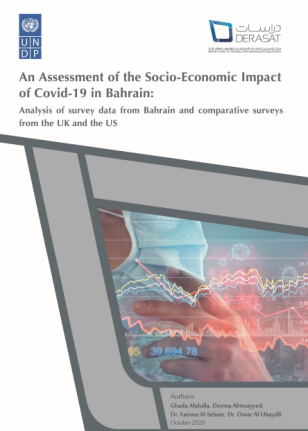An assessment on the Socio-Economic impact Impact of COVID-19 in Bahrain

An assessment on the Socio-Economic impact Impact of COVID-19 in Bahrain
October 12, 2020
In September 2020, approximately 3,000 participants took part in three short online surveys assessing the socioeconomic impact of Covid-19. One of them was carried out in Bahrain, and the other two in the UK and in the US, the latter two executed for comparison purposes. The surveys fell under the umbrella of UNDP’s international efforts at gauging the consequences of the pandemic by working with local partners, or the Socio-Economic Impact Assessment; the specific project covered by this report is the result of a partnership between Derasat and UNDP Bahrain.
The Kingdom of Bahrain has been acutely affected by the pandemic. Though its death rate of 143 deaths per million has been approximately equal to the world average of 129, the economy has been severely affected by the loss of international tourists and the sharp decline in oil prices, leading to a second-quarter decline in GDP equal to approximately 9% (IGA, 2020). In an attempt to limit the impact, Bahrain’s government has experimented with new policies, such as paying utility bills on behalf of citizens, paying the salaries of citizens working in the private sector (both as part of a large fiscal stimulus package), deferring loan repayments, and developing systems for remote working and distance learning.
High quality data constitute an important input into the policymaking process, both as inspiration during the genesis phase, and as a source of instructions on how to fine-tune policies during the revision stage. The unprecedented nature of the Covid-19 pandemic means that many of the traditional and extant data-gathering systems need to be developed to ensure that policymakers acquire the information that they need. Moreover, all societal stakeholders, including individuals and civil society organizations, need to have a continuous flow of up to date information to allow them to assess their own interests accurately, and to enable them to participate in solving the difficult problems raised by the pandemic.

 Locations
Locations